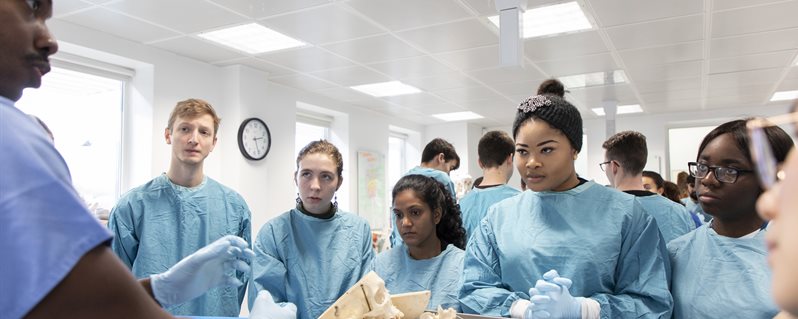Choosing where to apply to university can be a bit of a headscratcher at the best of times. But throw in a global pandemic, which largely eliminates the possibility of going to visit campuses across the country on open days, and you could be forgiven for finding the choice of institution a bit overwhelming. With such an abundance of information online and from such a wide variety of sources, it might be difficult to know where to begin.
That’s (hopefully) where this article comes in. From whether teaching is traditional or integrated to whether or not it’s possible to get decent grub for under a fiver, Matt Cowdock, Student Recruitment Coordinator at BSMS, will be going through some of the top things to consider when applying for medical school!
The course
If you’re going to be studying for five years, you’ll at least want to enjoy what you’re doing. While the General Medical Council has standardised the actual course content of undergraduate medicine degrees across the country, the way these degrees are taught varies from medical school to medical school.
A common trope in pre-application discussions is what sort of teaching underpins the curriculum. Some medical schools offer what’s known as ‘traditional’ teaching, which usually consists of two-to-three years of pre-clinical learning solely based on the scientific theory of medicine. Traditional teaching is contrasted with ‘integrated’ learning – this approach weaving the scientific theory in with clinical training, hence the name. If you’re keen to first build confidence on a bedrock of scientific facts before starting any placements, traditional courses might suit you better. However, if you prefer to dive into more hands-on learning, you might want to opt for an integrated approach.
Along with whether medical schools offer full-body dissection to help teach anatomy, opportunities to customise your course through electives, intercalation or Student-Selected Components, or simply how regularly you’ll be assessed, there’s a lot to consider when it comes to the course. But when trying to decide on your four potential medical school destinations, there’s no better place to start.

BSMS is one of the only medical schools in the UK to offer full-cadaveric dissection.
Size of the medical school
The number of students at any given medical school can vary and this can slightly alter the kind of place a medical school becomes.
Big medical schools might offer the opportunity to be part of a large and diverse student body, replete with like-minded individuals and potential friends for life. Additionally, attending a larger medical school may mean more options when it comes to rotations and faculty expertise. If you like the idea of becoming part of something bigger and immersing yourself with everything that entails, you might wish to opt for a larger medical school.
However, that isn’t to say that you’ll find none of that at a smaller medical school. A less substantial student body, for example, imbues a sense of community and familiarity between your peers. In short, a small institution might often bring with it the Cheers effect: where everybody knows your name. Add in smaller group teaching and perhaps closer working with your professors, and a smaller university becomes an incredibly enticing option.
Cost of location
Much in keeping with the logic behind researching the course first and foremost, if you’re going to be spending five years somewhere, you’ll want to make the most of that time. However, that will (quite literally, in this instance) come at a cost.
It’s no secret that some areas of the UK are more expensive than others. Living in or near a city is seen as ideal for many students across the country – the chance to experience all the usual bells and whistles that students want and need, in addition to immersing themselves in the city’s unique and vibrant character which sets it apart. Frustratingly, this will often come with an increased cost of living.
Whether you’re willing to pay a little more to experience a big city atmosphere somewhere like Manchester or London or pay a little less for picturesque (if a little less jam-packed) cities like Canterbury or Norwich, it’s certainly something you’ll want to consider when applying.

Student satisfaction
The difficulty with using one or even a combination of the above metrics is that it’s tricky to get an at-a-glance look at a medical school. This is where student satisfaction surveys come in – most notably the National Student Survey (NSS).
Taken every year, the NSS surveys final year students from every university on swathes of key issues pertaining to their overall satisfaction with the institution. This is given as a percentage, which allows you to see easily the proportion of students who were satisfied overall with their time at university.
Usually, consistency is key in these metrics – BSMS, for example, has achieved over 90% student satisfaction for the past decade, including a country-topping 97% in 2017. If you can excuse the slight humblebrag, this is a good indication of when a medical school is getting things right. You can find NSS results in each different category by visiting the government’s Discover Uni tool.
Finding out more
Regardless of which of these aspects you’re most concerned with, there are still a plethora of ways you can ensure you make the best decisions for you. While we wait to welcome visitors back onto campuses, universities across the country will be running Virtual Open Days all summer long, while UCAS events both digital and in-person are still penned in for the remainder of the academic year and beyond. If you're interested in attending one of our BSMS Virtual Open Days please keep an eye on our events page and Virtual Open Day hub as we will be releasing dates soon. In the meantime, if you're keen to register your interest in attending please email virtualopenday@bsms.ac.uk.
Finally, if you have any questions for specific universities, always remember that you can rely on the information straight from the horse’s mouth. Much like at BSMS, medical schools have admissions officers who are more than happy to answer any and all queries you might have about their course, cost of living or general student experience. You can get in touch with ours at outreach@bsms.ac.uk.
Find out more about our undergraduate course >